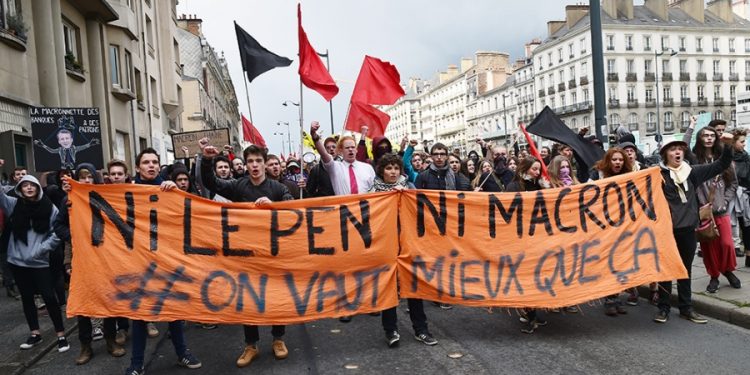By Miguel Lamas, a leader of the IWU-FI
27 April 2022. Emmanuel Macron was re-elected President of France in the run-off election against the far-right Le Pen with a high abstention rate of 28 per cent (the highest since 1969, according to the French May) and a further 6 per cent of invalid votes. Macron’s victory did not trigger jubilant celebrations among the population.
On Sunday evening, when the results were announced, the streets of Paris were empty. The votes he received from sections of the people were largely due to their desire to prevent a victory for Le Pen’s far-right. But in the days leading up to the elections, there were large student and worker mobilisations with the slogan “Neither Macron nor Le Pen”.
In the first round, centre-left politician Jean-Luc Mélenchon of France Insoumise had received 22 per cent of the vote, Le Pen 23 per cent and Macron 27 per cent.
Marine Le Pen won an important vote of farmers and workers who hate Macron for passing the economic crisis on to the workers.
New elections will now be held in June to choose parliamentarians. The centre-left candidate Melenchon expects to win with the support of the Communist Party (CP) and the Socialist Party (PS), which used to be strong but have virtually disappeared in recent elections.
The PS, a Social Democrat, has governed France for years. Macron himself, before becoming president, was finance minister in a PS government. And before becoming minister, he was deputy director of the big Rothschild bank, which is linked to the transnational companies Nestlé and Pfizer.
Economic, social and political crisis
The general scheme of this election is the aftermath of the economic crisis that has been unleashed on working people in recent years. Macron cut taxes for big business and facilitated job insecurity and layoffs. This situation was met with large popular mobilisations, such as that of the “yellow waistcoats” (against the increase in petrol prices) and large strikes.
The political consequence was a total and growing discrediting of the old parties, from the traditional right to the centre-left of the PS and the PC, which governed or co-governed.
Macron emerged and triumphed in 2017 by distancing himself from these old parties, saying he was “neither left nor right” and that he would govern pragmatically “without ideologies” to “improve the economy”. Now, back on the campaign trail, he spoke of “protecting the weak”, while in recent months in France many basic foodstuffs have risen by up to 85 per cent because of the war in Ukraine, without any increase in wages.
Moreover, and for similar reasons of a break with the old parties, Le Pen’s extreme right grew.
The need to build a revolutionary alternative
Unfortunately, the organisations calling themselves Trotskyist and standing for election as the New Anti-Capitalist Party and Workers’ Struggle received very few votes in the first round. They did not campaign for a unity of the revolutionary left and workers that could have created a visible alternative for the oppressed masses that breaks with the old parties.
For the second round, the centre-left Melenchon, capitalising on the votes of the left, called for a vote “against Le Pen”, but said nothing about Macron and now plans to win the parliamentary elections to co-govern as prime minister, as French law provides.
In the short term, Macron’s uncertain victory makes possible and necessary the unity of the workers’ struggle, who are demanding from the trade union centres a plan of struggle for the most urgent demands, for wage increases, against raising the retirement age, for the defence of jobs, against dismissals, for taxes on big business. The student and workers demonstrations “neither Macron nor Le Pen” show the need to build a revolutionary alternative to the capitalist and political crisis in France.













